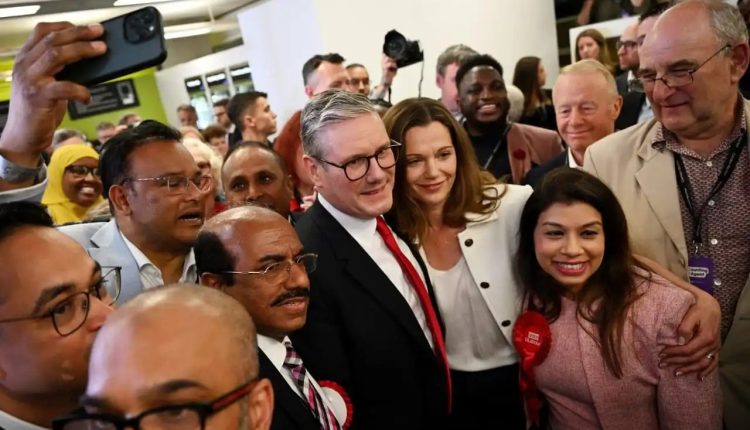Tinubu felicitates new UK Prime Minister on election victory
Joseph Irikefe
President Bola Tinubu has sent a message of congratulation to Keir Starmer, leader of the Labour Party, on his party’s victory in the United Kingdom general election.
In a statement released on Friday, June 5, in Abuja by his Special Adviser, Chief Ajuri Ngelale, Tinubu commended Starmer’s determination and courage throughout his years in opposition and as the leader of the Labour Party.
Tinubu highlighted that the Labour Party’s ability to reform, mobilize, and achieve victory after 14 years is a testament to Starmer’s leadership qualities.
Additionally, President Tinubu extended his congratulations to the citizens and government of the United Kingdom.
Furthermore, he praised the country as a steadfast model of democracy and a long-standing partner of Nigeria.
President Tinubu further extended his congratulations to the citizens and government of the United Kingdom.
UK Labour Party leader, Keir Starmer became Prime Minister yesterday, replacing his Conservative Party counterpart, Rishi Sunak, who has presided over one of the worst electoral losses in British political history.
Meanwhile, prisons are about to overflow, and some city and regional governments are about to go bankrupt or have already done so. Several colleges also look likely to go bust.
The party itself also has potential problems. Opinion polls and interviews suggest that many voters were motivated not by love for Labour but rather by a desire to punish the Conservatives for 14 years of scandals and policy missteps. It raises the prospect that Labour’s support — while wide — could be shallow and brittle, shattering just as easily as it came together.
Labour victories, especially landslides, are rarities in British politics, which has been dominated by the Conservative Party since World War II. Throughout its 120 years, Labour has been in power for only a little over 30 of them. And since the war, only three of its leaders have beaten the Conservatives, the last of them Tony Blair back in 2005.
Labour is traditionally seen as a left-of-center party. But like Blair, Starmer has shifted to the middle ground.
He has hewed closely to some Conservative policies by vowing to control budgetary spending and not raise taxes, as well as talking tough on immigration and social security. He has also been unafraid to deploy the Union Flag and other imagery that plays well with older, more socially conservative voters, even though plenty of younger, left-wing voters find it trite and nationalistic.
Some commentators have criticized Starmer for being too cautious and even timid given the scale of challenges Britain faces on both the domestic and international fronts.
Looming largest is the possibility that he may have to work with former President Donald Trump, not exactly a natural bedfellow for a self-described socialist.
He has made it clear he will work with whoever wins the presidency in November, although that relationship is likely to be made more awkward by comments his foreign policy chief made in 2018.
David Lammy, back then still a regular lawmaker, called Trump a “woman-hating neo-Nazi-sympathizing sociopath” and a “profound threat to the international order.”
Mindful of the possibility of this impending trans-Atlantic relationship, Starmer distanced himself from Lammy’s comments last week.
“I know the job of the person who leads our country is to deal with the leaders of other countries, who are elected by their people,” he told the BBC. “You don’t always get to choose the leaders of other countries.”
The U.K. has always touted its “special relationship” with Washington, and President Joe Biden, who is certainly closer to Labour’s politics and style of governance, has called London his closest ally.
On defense, Starmer has mirrored the Conservative promise to raise military spending to 2.5 per cent of the country’s gross domestic product — a slight rise over last year and above NATO’s recommended 2% target. But, with fears that Russia’s invasion of Ukraine might one day spread into other parts of Europe, military officials say the British armed forces remain dangerously threadbare.
Rob Johnson, until recently the official tasked with gauging Britain’s military strength, told The Financial Times newspaper this week that the U.K. was unprepared for a “conflict of any scale” and was operating at a “bare minimum” needed for peacekeeping and humanitarian operations.
One of Trump’s major criticisms of Europe is that for too long it has relied on American military might for protection against Russia.
On the environment, Labour says it will not grant any new oil and gas licenses, and it vows to roll out green energy across Britain. However, the charity Greenpeace says that “their investment in the green transition doesn’t go far enough.”
When it comes to China, the party is likely to continue with the policy of strategic ambiguity that characterizes all of Europe’s main powers. They routinely criticize Beijing’s human rights record while recognizing that their economies would collapse were it not for trade with China. [additional report by NBC News]


